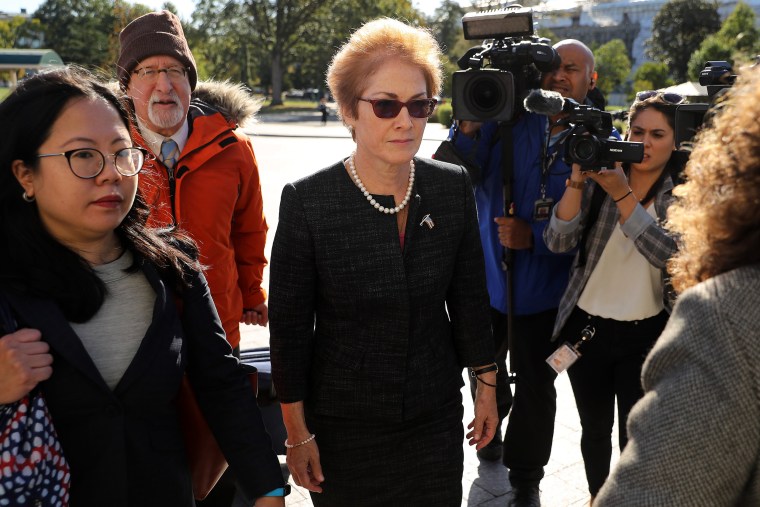WASHINGTON — For the first time next Wednesday, with cameras rolling, House Democrats will begin broadcasting a dramatic story about the corruption of American democracy and governance that they contend not only reaches into the Oval Office but bears the unmistakable fingerprints of President Donald Trump.
Their challenge in impeaching Trump is keeping the tale of his Ukraine scandal simple as they try to move forward through a thicket of Republican defenses; characters unfamiliar to the public; and constitutional, legal and political principles most Americans haven't considered since their last civics class.
"We have a tendency to get in the weeds on this," said Stacey Plaskett, the Democratic delegate from the U.S. Virgin Islands and a former senior official in the Bush Justice Department, who is a member of the three-committee panel that has been conducting impeachment hearings behind closed doors. "I use the words extortion and bribery. I think those are words that Americans can understand."
If Democrats are successful, voters will accept the narrative they unspool with the help of witness testimony over the coming weeks: That Trump has committed crimes against the country by putting his personal goals above national interests and abusing the powers of his office to achieve them.
In turn, they hope, voters will put enough pressure on Republicans in Congress to remove Trump through the impeachment process, or, short of that, will punish Trump and GOP lawmakers who stand by him at the polls next November.
If they fail to capture and channel the anger of the electorate — or worse for them, if they bring that on themselves — Trump will be emboldened and they will run the risk of improving both his chances of winning re-election and the GOP's hopes of taking back control of the House.
In other words, there's a lot riding on Democrats' ability to convince the public that Trump acted corruptly and that they are seeking the right remedy.
"This is so basic," Sen. Kamala Harris, D-Calif., a 2020 Democratic presidential candidate, said on MSNBC's "Morning Joe" on Thursday. "This is not like we don’t know what happened. We know what happened. It happened in plain view."
To tell the story, they will rely on a cast of Joe Friday-style career public servants from the ranks of the military, the State Department and the National Security Council, as well as Trump-picked officials who have reluctantly found themselves in the position of giving testimony that is not helpful to his case.
This unlikely ensemble, already testifying behind closed doors, will soon tell the public that Trump deployed the vast resources at his disposal — including Cabinet secretaries, private lawyer Rudy Giuliani and $391 million in U.S. foreign aid — to bully a war-ravaged Ukraine into agreeing to open an investigation into former Vice President Joe Biden and his son Hunter.
Several of them will say, under penalty of perjury, that the president created a construct in which Ukrainian President Volodymyr Zelenskiy would be required to announce a Biden probe in exchange for the release of the cash and an in-person meeting with Trump.
From the outset, Speaker Nancy Pelosi, D-Calif., has said that the act of pushing a foreign country to open a probe into a leading opponent to Trump's 2020 re-election is enough of an offense, with or without the offer of anything in exchange.
But Trump's allies initially framed his potential culpability in the Ukraine affair around the question of whether he had engaged in a quid pro quo — the Latin phrase that is legal shorthand for a deal — and declared that he had not.
When the White House released a partial transcript of a July 25 phone call between Trump and Zelenskiy in late September, Rep. Jim Jordan, R-Ohio, perhaps the president's most combative defender on Capitol Hill, tweeted "no quid pro quo." The next day, Larry Kudlow, director of the president's National Economic Council, said the same thing. Since then, the term quid pro quo has been at the forefront of the public discussion of the story.
"The quid pro quo sanitizes what happened here," Joe Scarborough, co-host of "Morning Joe" and a former Republican House member from Florida, said Thursday. "This is Donald Trump extorting a democratic power that’s under invasion by Vladimir Putin’s Russia, saying we’re not going to help you survive, we’re not going to help you push back the Russian invaders, we’re not going to help you save your country unless you give me dirt on my political opponent."
While Trump and his closest allies have insisted he did nothing wrong, that's not a unifying message for GOP lawmakers, some of whom have been reluctant to bless his conduct.
Ron Bonjean, a former aide to Republican leaders on both sides of Capitol Hill, said the best strategy for the GOP is to portray Democrats as hellbent on denying voters a chance to re-elect Trump.
"Republicans should respond to these hearings by remaining at 30,000 feet and calling it a political charade that's serving the Democratic leadership's interests of trying to remove the president instead of letting voters decide for themselves next year," he said.
Kurt Bardella, a former House Republican aide who worked on contentious congressional hearings, said Democrats will have a battle on their hands as Republicans try to discredit the investigation.
"Democrats will fight to have the story of the witnesses told," he said.

